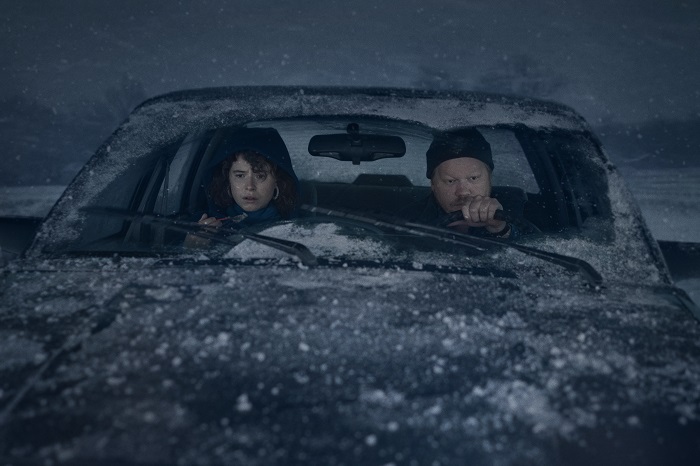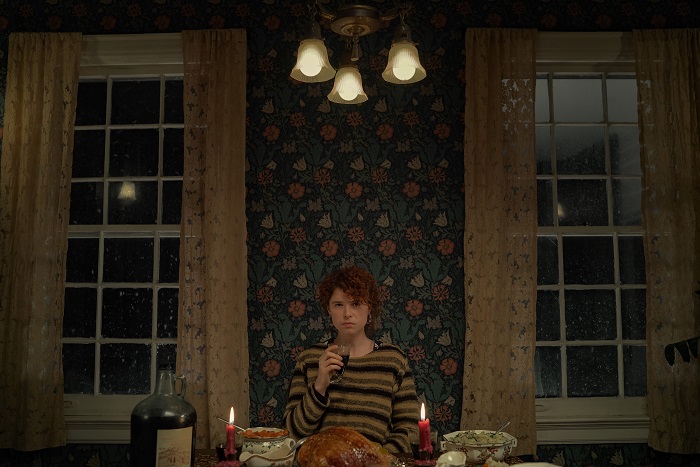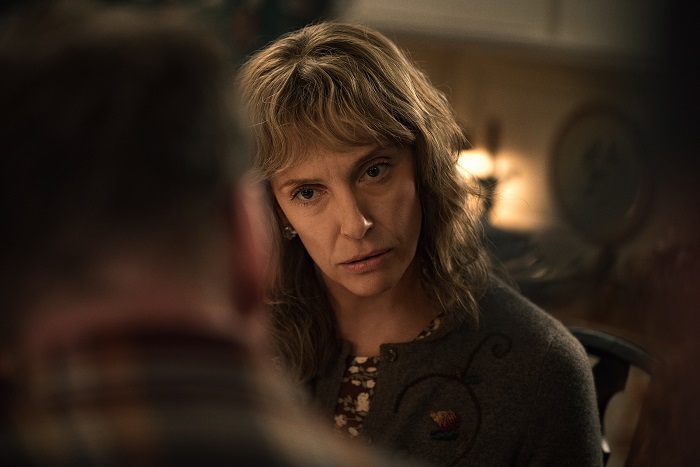

Spoilers: This is Not a Review of ‘I’m Thinking of Ending Things’
By Roxana Hadadi | Film | September 14, 2020 |
By Roxana Hadadi | Film | September 14, 2020 |

SPOILERS FOLLOW FOR THE FILM I’M THINKING OF ENDING THINGS
The nature of being a film and TV critic is that you watch so much stuff. SO MUCH STUFF. Some of it you love, some of it you hate, and most of it is fine. It exists. It probably meant a lot to the people who produced it, who devoted time to creating it and crafting it, and more power to them. Not everything has the same impact for everyone. Some pieces of media just exist there, floating in the ether, and you can describe them as, “Oh, yeah, that’s not for me.” All of Netflix’s holiday romances: Not for me. Joker: Not for me! Movies about ex-military guys finding their redemption in saving brown children: NOT. FOR. ME.
It only becomes a problem when, you know, it’s your job to have opinions on things, but then you have no opinions about the thing you have been assigned to have opinions on. And that is the story of how I was assigned to review Charlie Kaufman’s I’m Thinking of Ending Things, and I’ve been struggling to come up with a reaction for two weeks now, and … I’ve got nothing. So no, this is not a review of I’m Thinking of Ending Things, but more a sort of exploration into why it didn’t work for me. We’ll get into SPOILERS here, and feel free to share your own thoughts in the comments.

Let’s start at the beginning, which makes sense, because we are living in a thoroughly linear world and not Christopher Nolan’s underwhelming Tenet. ZING! OK, I’m sorry, back to the task at hand. Anyway: I’m Thinking of Ending Things tips its hand too early. From the first few minutes, as soon as the older male character is introduced, you can probably guess that is in fact the same person as Jesse Plemons’s character. Production design details make this clear: The man is standing in the same house that is prevalently featured in Netflix’s marketing materials for the film. It’s the same wallpaper, the same interior design. Locations move around in the film because we are walking around inside a mind, after all, so while the character played by Jessie Buckley—never consistently named, but referred to by various names including Lucy and Ames—waits outside for her boyfriend Jake (Plemons) to pick her up, she senses the man watching her from his window, from an apartment above the street. But the man, in his own mind, is living in the farmhouse, where Buckley’s and Plemons’s characters will eventually go.
The movie is full of collapses and swerves like this—scenes that begin one way and transition into something else—and I must admit to you that I found this exhausting to watch precisely because I think these elements are supposed to be surprises in the narrative, but Kaufman telegraphs them so hard that I found them more irritating than shocking. I found it obvious from the beginning, because of the cross-cutting between Buckley/Plemons on their road trip and Guy Boyd as the janitor going about his day cleaning a high school, that these stories were interrelated. And guessing that from the onset made me less patient with the circular nature of how Buckley’s and Plemons’s characters communicate with each other: During the ride, it seems either like the former is actually voicing her private thoughts instead of keeping them to herself, or like the latter is reading her mind.
“You can’t fake a thought,” Buckley’s character thinks, or maybe she says, but her entirety is fake because Kaufman doesn’t really give her interiority. She is such a clear extension of Jake that I found all of their exchanges grueling, in particular the dialogue that makes Jake seem like a concerned partner: “It’s good to remind yourself that the world is larger than the inside of your own head,” he says, and do you get it, it is actually all in his own head! Buckley’s character reciting the William Wordsworth poem; the malleability of the story she tells at the farmhouse to Jake’s parents (played by David Thewlis and Toni Collette, going full unhinged) about how the two of them met; how often her outfits keep changing details and colors; how she thinks a childhood picture of her is hanging in Jake’s home; how she sees a collection of Pauline Kael’s film criticism in Jake’s childhood bedroom, and then starts speaking like Kael when arguing with Jake about film later. We get it! She’s him! What else are you saying about that, though?

The “what else,” I guess, is Kaufman’s ending, which is far different from the conclusion of Iain Reid’s novella. Kaufman sticks to Reid’s horror vibe for the first two-thirds of the film, and to be honest, I did enjoy that atmosphere. Yes, Buckley’s character is clearly a figment of Jake’s imagination, but at least the barn scene was chilling, and everything about Jake’s parents was weird and unsettling, and in my bleakest moments, the line “It’s a uniquely human fantasy that things will get better” slaps pretty hard. But once Buckley/Plemons arrive at the high school where the older man works, the diversions from Reid’s novella are most clear. So, one more SPOILERS SPOILERS SPOILERS warning for you …
SPOILERS
SPOILERS
SPOILERS
… Before I say that I wish the film had kept Reid’s ending, in which the janitor reveals himself to be the elder Jake, jealous of his own creation of the girlfriend, and encourages the girlfriend character to kill herself, which in fact kills him, too. There is more of a backstory in the book about how disturbed the Jake character was, and how he lived in his own fantasy world—hence all that stuff with the ice-cream stand in the movie—and I can understand that a story about a person with mental illness ending in a brutal death is also problematic in its own way. But at least that ending feels tonally connected with the majority of the preceding novella, which is paranoid and eerie. When Kaufman starts inserting ballet scenes and musical homages and getting super experimental with the ending of the film, I just noped out. There is no tonal connectivity here, and I didn’t find the shifting perspective successful because while watching it, I never considered Buckley’s character as a real person anyway. Ultimately, I think that is the greatest failure of I’m Thinking of Ending Things for me: Because Buckley’s character is just a plot device, it’s an uphill battle getting invested in her story at all, and the film never takes the next step of having her reckon with her own artifice. Instead, the characters are at a distance from each other, and we’re even further away.
A.A. Dowd’s review at The A.V. Club does a great job breaking down how this is all a journey into a confused mind, and Shea Vassar wrote a long piece for Film School Rejects analyzing the dance scene. I respect how much this film resonated with my colleagues! It has received mostly very positive reviews! But for me, at the end, when Jake’s character is accepting a Nobel Prize, and performing a song from Oklahoma! to an adoring audience that includes Buckley’s characters and the young women we’d seen previously in the film? I could not care less. Could not care less! I wanted a psychological horror, not just another “White guy gets lost in his own mind and here is the result” journey. I was just bored. “It is only in the mysterious equations of love that any logical reasons can be found,” Jake says when accepting the Nobel, and yeah, cool story, dude. I guess? I’m just going to watch Eternal Sunshine of the Spotless Mind for the millionth time and call it good.
I’m Thinking of Ending Things is streaming on Netflix as of Sept. 4, 2020.
← Dave Grohl is a Good Dude | Review: HBO's 'The Third Day' May Have Enough Stylistic Flair to Overcome a Very Familiar Premise →
More Like This
Cartoon Ramona Flowers From 'Scott Pilgrim Takes Off' Can Get It
‘The Buccaneers’ Is a Fabulously Frothy CW-Style Soap
The 'Loki' Finale Just Gave Marvel A Way To Dump Kang. Will They Take It?
Which Twin Flames Universe Docuseries Is Right for You?
Put Sandra Oh In More Comedies

What’s Old Is New Again: Old Hollywood Glamour Glitters at the 2024 Oscars
Al Pacino Presents Best Picture Oscar, Confuses Everyone
The Dangerous Lie Of 'TradWives'
A Legendary Horror Franchise Is Headed To Television
'The Mandalorian' Season 4 Is Probably Not Happening
Halle Bailey On Why She Chose To Keep Her Pregnancy Private
More Like This
Cartoon Ramona Flowers From 'Scott Pilgrim Takes Off' Can Get It
‘The Buccaneers’ Is a Fabulously Frothy CW-Style Soap
The 'Loki' Finale Just Gave Marvel A Way To Dump Kang. Will They Take It?
Which Twin Flames Universe Docuseries Is Right for You?
Put Sandra Oh In More Comedies
Reviews